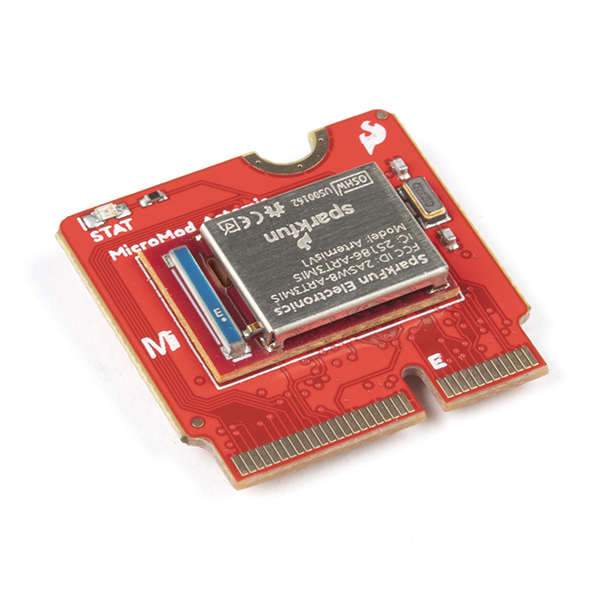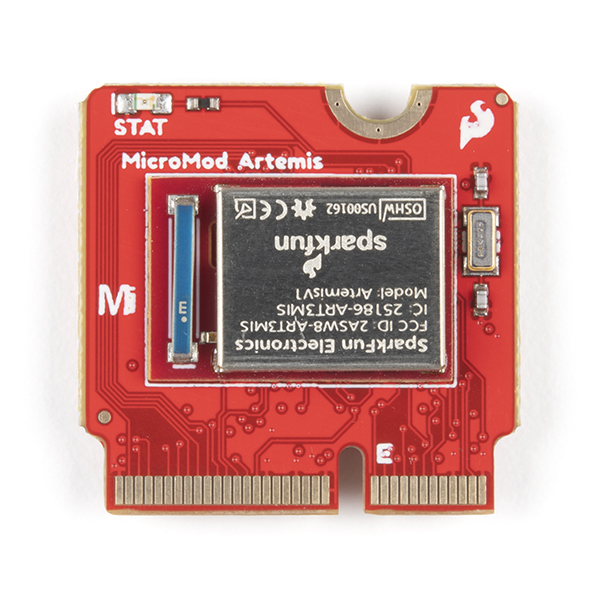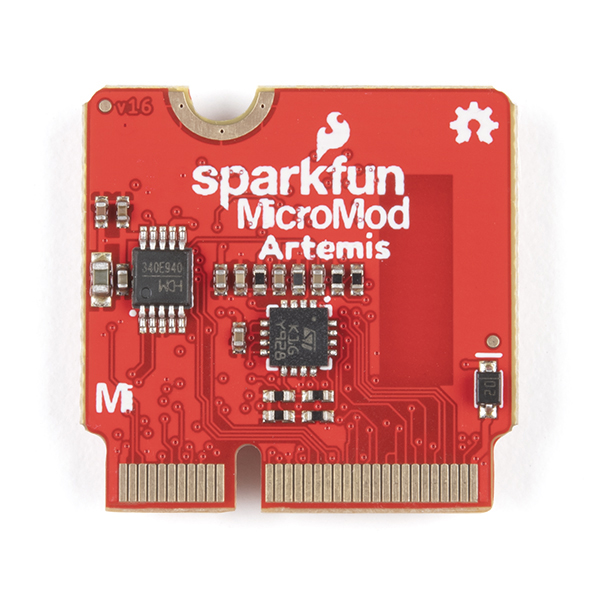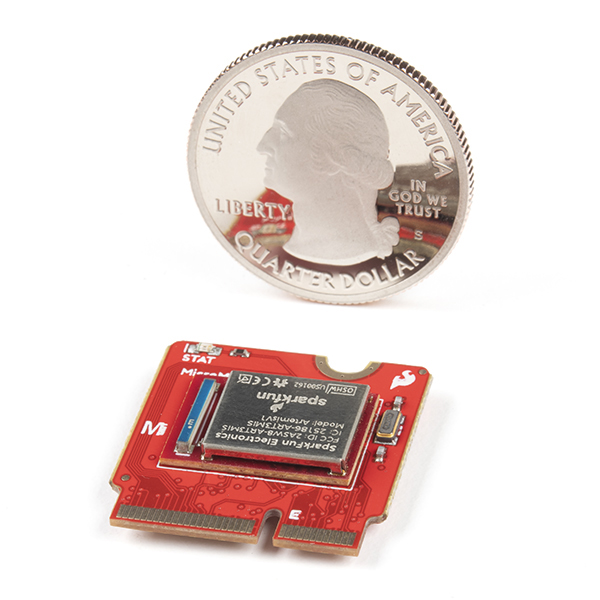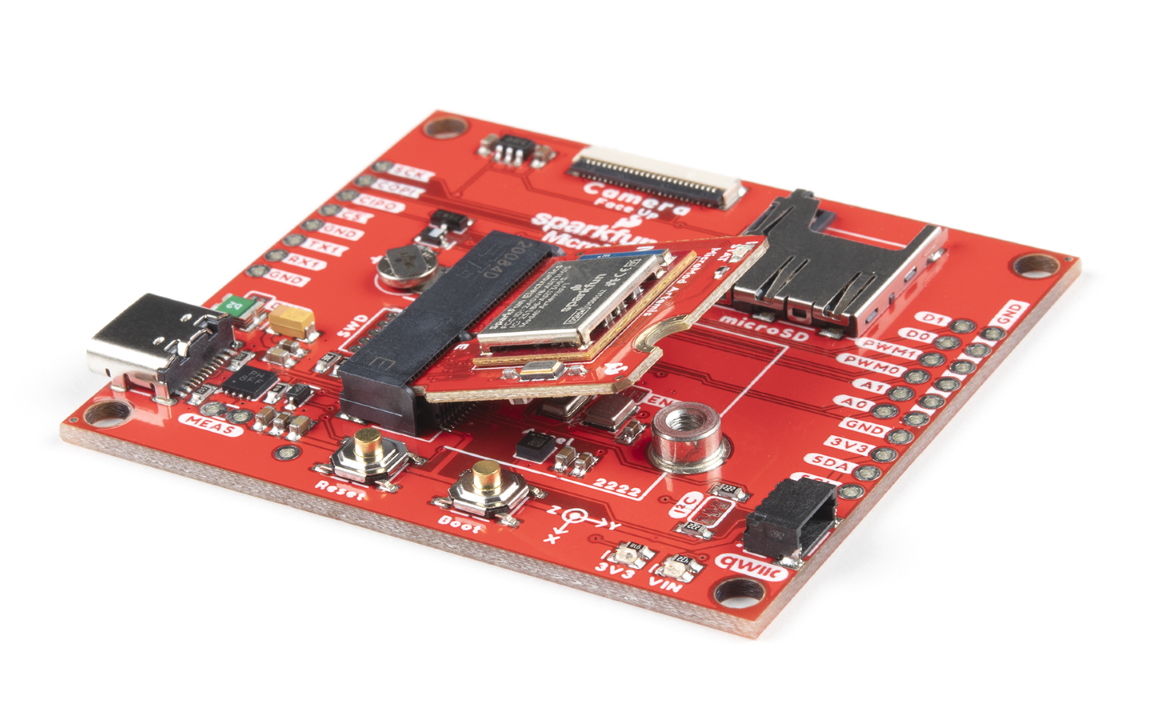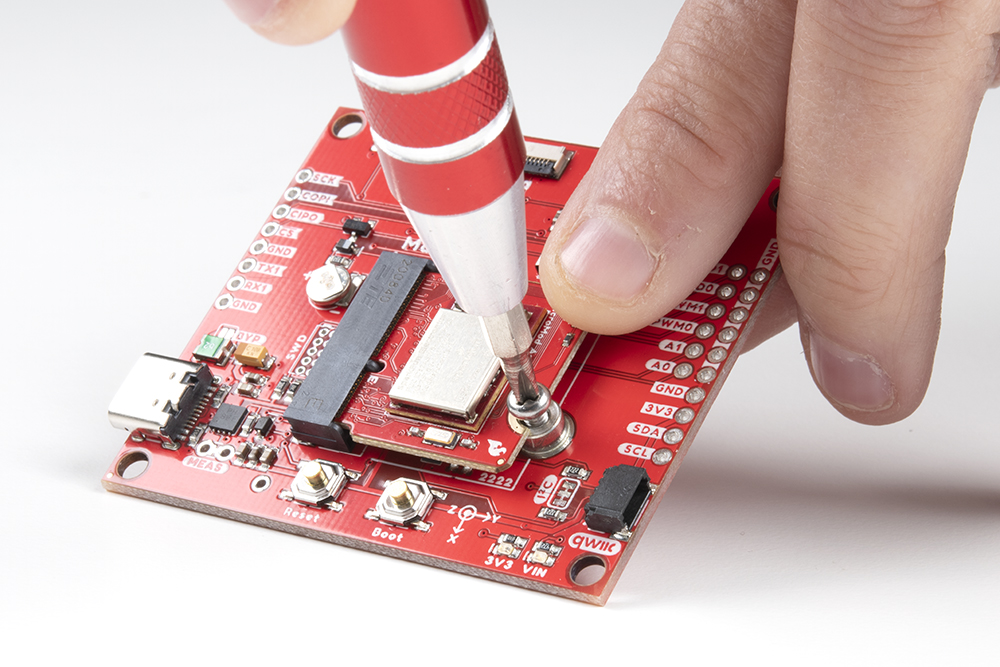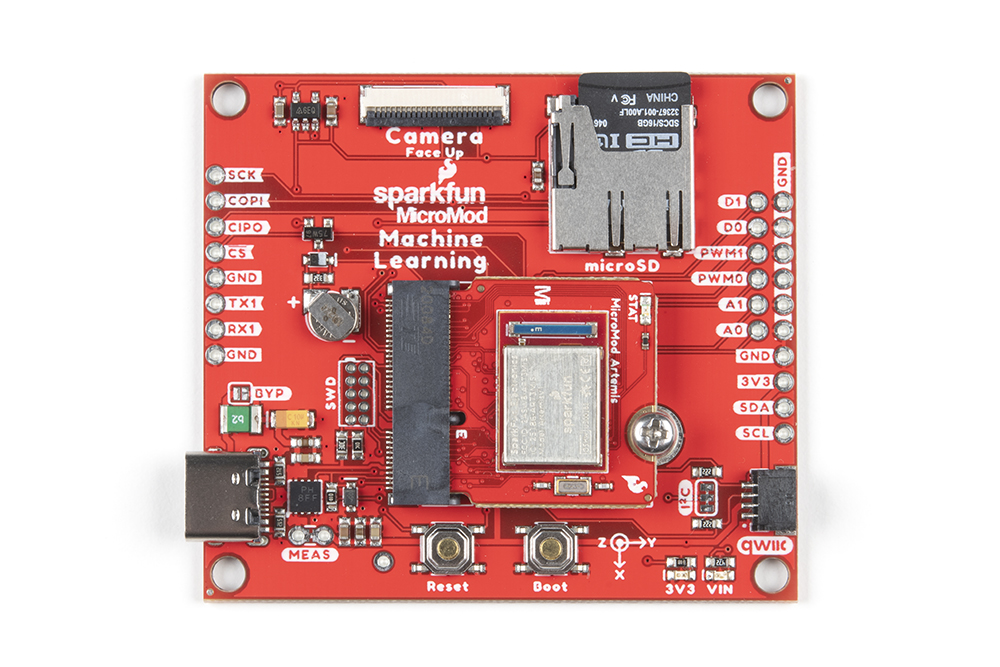Leveraging the ultra powerful Artemis Module, the SparkFun MicroMod Artemis Processor is the brain board of your dreams. With a Cortex-M4F with BLE 5.0 running up to 96MHz and with as low power as 6uA per MHz (less than 5mW), the M.2 MicroMod connector allows you to plug in a MicroMod Carrier Board with any number of peripherals. Let's have a look at what this processor board has to offer! If you need Machine Learning capabilities, Bluetooth, I2C functionality to connect to all our amazing Qwiic boards, and more the Artemis Processor is the perfect choice for your MicroMod Carrier Board.
At the heart of SparkFun's Artemis Module is Ambiq Micro's Apollo3 processor, whose ultra-efficient ARM Cortex-M4F processor is spec’d to run TensorFlow Lite using only 6uA/MHz. We've routed two I2C buses, eight GPIO, dedicated digital, analog, and PWM pins, multiple SPI as well as QuadSPI, and Bluetooth to boot. You really can't go wrong with this processor. Grab one today, pick up a compatible carrier board, and get hacking!
MicroMod is a modular interface ecosystem that connects a microcontroller “processor board” to various “carrier board” peripherals. Utilizing the M.2 standard, the MicroMod standard is designed to easily swap out processors on the fly. Pair a specialized carrier board for the project you need with your choice of compatible processor!
Artemis General Features:
- 1M Flash / 384k RAM
- 48MHz / 96MHz turbo available
- 6uA/MHz (operates less than 5mW at full operation)
- 48 GPIO - all interrupt capable
- 31 PWM channels
- Built in BLE radio and antenna
- 10 ADC channels with 14-bit precision with up to 2.67 million samples per second effective continuous, multi-slot sampling rate
- 2 channel differential ADC
- 2 UARTs
- 6 I2C buses
- 6 SPI buses
- 2/4/8-bit SPI bus
- PDM interface
- I2S Interface
- Secure 'Smart Card' interface
- FCC/IC/CE Certified (ID Number 2ASW8-ART3MIS)
Specific Peripherals made available on MicroMod Artemis:
- 1x USB dedicated for programming and debug
- 1x UART with flow control
- 2x I2C
- 1x SPI
- 1x Quad-SPI
- 8x Fast GPIO
- 2x Digital Pins
- 2x Analog Pins
- 2x PWM
- 1x Differential ADC pair
- Status LED
- VIN Level ADC
Additional peripherals are available but are shared on dedicated MicroMod pins.
MicroMod Artemis Processor Documentation:
MicroMod Documentation:
- SparkFun MicroMod Interface v1.0 - Pinout
- SparkFun MicroMod Interface v1.0 - Pin Descriptions
- Getting Started with MicroMod
- Designing with MicroMod
- MicroMod Info Page
- MicroMod Forums
- SparkFun Eagle Libraries contains example footprints for the M.2 connector and SMD standoff
- M.2 MicroMod Connector Datasheet
- MicroMod Reflowable Standoff Datasheet
Artemis Documentation:
SparkFun MicroMod Artemis Processor Product Help and Resources
Getting Started with MicroMod
October 21, 2020
Dive into the world of MicroMod - a compact interface to connect a microcontroller to various peripherals via the M.2 Connector!
MicroMod Artemis Processor Board Hookup Guide
October 21, 2020
Get started with the Artemis MicroMod Processor Board in this tutorial!
MicroMod Weather Carrier Board Hookup Guide
January 14, 2021
A quick guide to help to create your own MicroMod weather station using the MicroMod Weather Carrier Board and Processor of your choice.
Designing with MicroMod
October 21, 2020
This tutorial will walk you through the specs of the MicroMod processor and carrier board as well as the basics of incorporating the MicroMod form factor into your own PCB designs!
MicroMod Machine Learning Carrier Board Hookup Guide
October 21, 2020
Get hacking with this tutorial on our Machine Learning Carrier Board!
MicroMod WiFi Function Board - DA16200 Hookup Guide
November 11, 2021
Add IoT functionality to any MicroMod project with the MicroMod WiFi function Board - DA16200!
Core Skill: Programming
If a board needs code or communicates somehow, you're going to need to know how to program or interface with it. The programming skill is all about communication and code.
Skill Level: Rookie - You will need a better fundamental understand of what code is, and how it works. You will be using beginner-level software and development tools like Arduino. You will be dealing directly with code, but numerous examples and libraries are available. Sensors or shields will communicate with serial or TTL.
See all skill levels
Core Skill: Electrical Prototyping
If it requires power, you need to know how much, what all the pins do, and how to hook it up. You may need to reference datasheets, schematics, and know the ins and outs of electronics.
Skill Level: Rookie - You may be required to know a bit more about the component, such as orientation, or how to hook it up, in addition to power requirements. You will need to understand polarized components.
See all skill levels
Comments
Looking for answers to technical questions?
We welcome your comments and suggestions below. However, if you are looking for solutions to technical questions please see our Technical Assistance page.
Customer Reviews
5 out of 5
Based on 1 ratings:
Great little MCU
After navigating through the quirks of using this board in PlatformIO, the Artemis is a great and very capable MCU!

